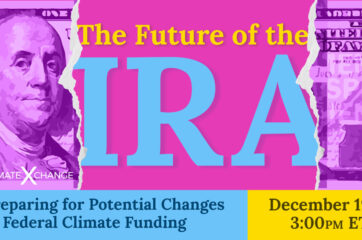Last week, Joe Biden and Kamala Harris formally accepted the Democratic nominations for President and Vice President at the Democratic National Convention (DNC). The convention was unprecedented this year, not only because of its almost entirely virtual format, but also because it gave more air time to the issue of climate change than ever before.
Although Joe Biden is certainly not the most progressive candidate who ran for the 2020 Democratic presidential nomination, his climate platform is the most ambitious of any presidential candidate in history. That became very clear during the convention, as climate change took a front seat.
A Segment Dedicated to Climate Change
For the first time, climate change received an entire segment during the DNC on Wednesday night. The segment, which began with snippets of Biden supporters across the country talking about the importance of solving the climate crisis, then presented three distinct parts: Governor Michelle Lujan Grisham of New Mexico speaking on the importance of climate policy, Robert Blair, a union worker in support of Biden’s climate plan, and a conversation with youth climate activists.
Gov. Lujan Grisham’s speech, with solar panels as a backdrop, focused on her state’s commitment to tackling the climate crisis despite President Trump’s rollback of environmental regulations. Coming from the third-largest oil producing state in the country, New Mexico’s dedication to solving climate change serves as an example for other fossil-fuel reliant states as to what a transition towards renewable energy can look like. Today, almost 20% of New Mexico’s energy is powered by wind, and the state has ambitious emissions reduction targets. The Governor also spoke highly of Biden’s environmental plans as an opportunity for America to become a leader on climate change once again.
Learn more about how Climate XChange supports climate leadership in the Southwest
“We know time is running out to save our planet. We have the chance this November to end two existential crises: The Trump presidency and the environmental annihilation he represents. We have the chance this November to attack the climate crisis, invest in green 21st-century jobs, and embrace the clean-energy revolution our country—our young people—are crying out for, and the leadership the rest of the world is waiting for. The choice is clear. The choice is Joe Biden,” said the Governor.
Next, an International Brotherhood of Electrical Workers union member, Robert Blair from Harrisburg, Pennsylvania, spoke on the benefits of Joe Biden’s climate plan, highlighting the potential of investments in green energy to create well-paying jobs across the country.
“Joe Biden’s plan will create millions of new, good-paying jobs. Many of them union. Like mine,” he told the country.
Lastly, three youth climate activists spoke about the importance of solving the climate crisis for the younger generation. Led by Alexandria Villaseñor, co-founder of the U.S. Youth Climate Strike movement who has been protesting climate change every Friday for the past two years, the young activists each spoke as to why solving the climate crisis is important to them. Villaseñor mentioned her asthma flaring badly when violent wildfires arose in California in 2015, Katherine Lorenzo from Nevada spoke about the detrimental effects of air pollution on her community’s health, and Andrew Adamski from Wisconsin touched on the need for farmers to move towards sustainable solutions, as his family has done on their farm.
The youth activists highlighted the importance the issue of climate change is to the younger generation of voters, and clearly demonstrated the Democratic party’s attempt to appeal to younger voters this election cycle.
Combating the Climate Crisis — A Recurring Theme Throughout the Convention
Many other speeches throughout the DNC also focused specifically on climate, not to mention Biden’s speech itself on the last night of the convention.
As Joe Biden accepted the Democratic nomination at the end of the convention, he made it clear that climate will be a priority for him if elected into office. Citing climate change as one of the four “historic crises” currently facing the U.S., on top of the coronavirus pandemic, the economic recession and racial injustice, Biden said our country must fight against “undeniable realities and accelerating threats of climate change,” and that we have no time to waste in doing so.
Other notable references to climate change include Governor Gavin Newsom of California, who gave his speech just a mile away from burning wildfires in the Santa Cruz forests.
“Climate change is real,” he said. “If you are in denial about climate change, come to California,” he said. The state has seen a particularly awful season of wildfires this summer, caused and exacerbated by the changing climate.
The unprecedented inclusion of climate change throughout the Convention is emblematic of a political shift in the United States to view the climate crisis as an important issue that must be solved urgently. In February of this year, a Climate Nexus survey found that climate change is the second most important issue for Democratic voters, after only health care. In fact, 78% of Democrats view climate change as a “top policy priority” this year, a larger percentage than ever before.
“This is the first time in American political history where climate change is not just a top-tier issue—it is the top-tier issue,” said Anthony Leiserowitz, director of the Yale Program on Climate Change Communication.
Not only has this shift caused climate change to become a far more prominent issue for the Democratic party, but it has also led towards far more ambitious solutions being included as a part of the major party’s platform.
In 2019 when Representative Alexandria Ocasio-Cortez and Senator Ed Markey released their Green New Deal, a comprehensive plan to reduce greenhouse gas emissions across the country, they were labeled “radical,” not only by conservative Republicans, but by moderate Democrats as well. In fact, Rep. Ocasio-Cortez joined activists from the Sunrise Movement, a group of young people fighting for more ambitious climate policies, in a protest right in front of Democrat Speaker of the House Nancy Pelosi’s office. But now, only one year later, the Democratic party has embraced many of the Green New Deal’s policies.
Although Joe Biden was one of the most moderate Democrats who ran in the primary, and is consistently viewed as a moderate politician, his climate plan draws heavily on the Green New Deal. The Unity Task Force he created to write his plan included Representative Ocasio-Cortez, as well as Varshini Prakash, founder of the Sunrise Movement.
Ambitious action on climate change is becoming increasingly embraced by the Democratic party, and its inclusion throughout the Convention proved that the party is listening to the concerns of its constituents on the climate crisis.
Democrat Climate Messaging Offers A Stark Contrast To The Trump Campaign
Throughout the week of the DNC, President Donald Trump traveled around to various swing states to speak, attempting to draw attention away from the Democratic campaign. In his speeches, he worked to paint Joe Biden as a radical left progressive, careless on matters of the economy. Repeatedly, the president has attacked Biden on the issue of fracking; in Pennsylvania, he told supporters, “you’re not going to be allowed to frack anymore. You’re not going to be allowed…What would happen is, well, first of all, many of you, I guess 600,000-670,000 lose their jobs.”
During the Republican National Convention, Republicans are using similar tactics to scare voters; during former U.S. Ambassador to the United Nations Nikki Haley’s speech, she stated that Democrats “want to ban fracking and kill millions of jobs.”
This is despite the fact that Biden has, many times, insisted that he will not ban fracking if elected into office. On top of that, Trump’s 600,000 job loss estimate has no factual evidence or modelling behind it. Biden’s climate plan is projected to create 10 million new clean energy jobs, as well as training programs for transitioning fossil fuel workers. Jobs also played prominently in the presentation of Joe Biden’s climate change plans, with an earlier montage focusing on a speech Biden gave in which he said, “When I think of climate change, I think of jobs.”
The Democratic Convention’s messaging on climate worked hard to fight against the Republican narrative, painting climate policy as an opportunity to create new jobs and improve our faltering economy. From Gov. Lujan Grisham’s speech, which mentioned new jobs in the renewable energy sector, to union member Robert Blair’s speech, which similarly focused on the need for union jobs in a green economy, the Democratic party painted the picture that boosting the economy and combating climate change will happen in tandem if Democrats are elected this fall.
Joe Biden himself focused particularly on the creation of jobs in his climate policy plans, mentioning his Build Back Better plan many times.
“Together we can, and we will, rebuild our economy, and when we do, we’ll not only build it back, we’ll build it back better,” said Vice President Biden, adding, “with modern roads, bridges, highways, broadband, ports and airports as a new foundation for economic growth.”
Biden’s messaging on strong climate policy comes after four years of a Trump presidency that has severely diminished the nation’s environmental regulations. The New York Times reports that Trump has repealed 68 climate policies so far, with 32 more deregulations in the pipeline. Trump has also consistently denied climate science, disbanding scientists from the Environmental Protection Agency and promoting misinformation campaigns denying human-caused climate change.
Although the president touts his climate policies as a way to better the American economy, Trump’s focus on fossil fuels and deregulation have actually cost the country jobs; a 2018 tariff on solar panels manufactured abroad lost an estimated 62,000 clean energy positions.
The Democratic Convention’s emphasis on creating jobs through green policies and investments appeals to Americans who are worried about the state of the economy and current unemployment rates, which are particularly worrisome due to Covid-19 related job loss. For years, Republicans have worked to pit strong environmental policies against strong economic policies, despite the lack of evidence that fighting climate change hurts the economy. This year, Democrats are giving voters the opportunity to vote for both the economy and the climate by emphasizing messaging that green investments can also spur massive job creation and economic growth.
Is The Democratic Party United On Climate?
The Democratic Convention served as a chance to also demonstrate unity within the party, with speakers ranging from Congresswomen Alexandria Ocasio-Cortez, one of the most progressive Democratic Representatives, to Former Governor of Ohio John Kasich, a Republican with far more conservative policy positions. The Democratic Party is clearly working hard to make their platform appeal to everyone, progressives and moderates alike.
But does this mean the Party is united on climate policy? The answer is still not totally clear. In a last minute effort, the Democratic National Committee decided to remove a clause from the party platform that would ban tax subsidies towards fossil fuel companies, upsetting environmentalists who for the most part were pleased with the party’s strongest climate platform yet.
There has been lots of confusion on this as well — a Democratic National Committee spokesperson told the Huffington Post that including the subsidy ban in the platform had been an error in the first place, while platform committee member John Laesch said that this statement was false, and that he had not given his consent to get rid of this policy.
Despite this move, Joe Biden reaffirmed his commitment to ending fossil fuel subsidies. His platform states, “there is simply no excuse for subsidizing fossil fuel, either in the United States or around the world.” Kamala Harris similarly supports eliminating fossil fuel subsidies.
Although there are some disagreements on policy specifics, evidenced by the party platform, the Democratic Convention made one thing clear — combating climate change will be an essential part of a Biden presidency if he is elected this November, and is an issue that Democrats across the party are calling for serious action on.
Of course, any plan to address climate change will be reliant on the political makeup of Congress this fall as well. Currently, while Democrats have control of the House of Representatives, Republicans hold a slight majority in the Senate. Even if Biden won the presidency, if the Senate party makeup does not change, passing any ambitious climate policy would be extremely difficult.
But if Democrats are able to gain control in Congress this November, a recent report written by the House Select Committee on the Climate Crisis suggests that Congressional goals align well with those of Joe Biden and the Democratic party, focusing on job creation, economic revitalization, and environmental justice.
As the Republican National Convention kicks off this week, there is little to no expectation that any of the speakers will address climate change. In fact, the entire Convention is expected to focus heavily on President Trump himself, rather than any policy specifics, as the Republican Party failed to publish a platform this year.
“This is more the Trump national convention than the Republican National Convention; that’s why (climate change) and many other issues important to Republicans are not being noted in the platform,” said former Republican Representative Carlos Curbelo from Florida. Many Republicans are upset with the fact that Trump continuously fails to acknowledge climate change as a serious issue, and believe it may cost the party votes, particularly younger ones.
While the Republican Convention relays the message that climate change is a non-issue, the Democratic Convention placed a clear emphasis on science, and with their attempt to create a united platform that both progressives and moderates can get behind, offers voters the option to tackle the climate crisis this November.
Not yet registered to vote? Register online here!









